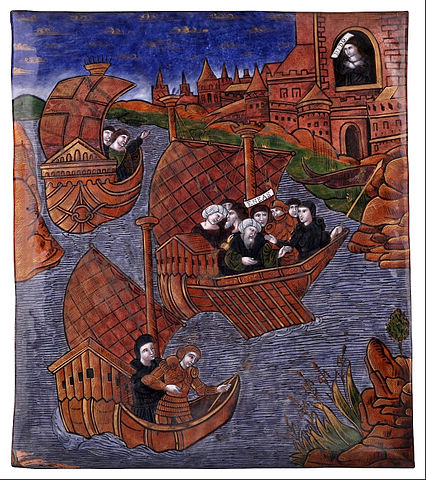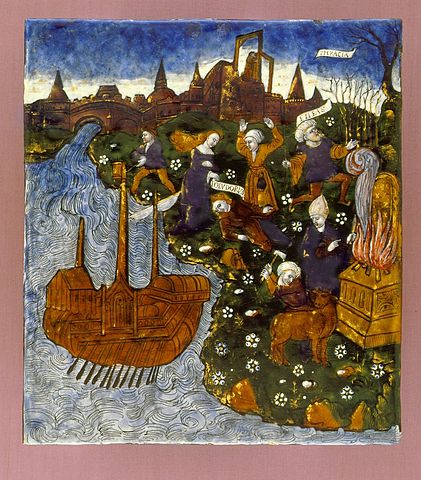
The Thammasat University Libraries have newly acquired one of the finest modern translations into English of The Aeneid of Virgil. It is by the American poet and translator Allen Mandelbaum. The Aeneid is a poem written in Latin over 2000 years ago. Yet it has some things to say that seem current to readers today. It is about a legendary warrior, Aeneas, from Troy, who conquers Italy. Its title means the story of Aeneas. There is much about war and fighting in the poem, one aspect which is unfortunately always relevant to the modern world. This new addition was made to the library collection through the generosity of two prize-winning historians, Professor Benedict Anderson and Ajarn Charnvit Kasetsiri. It is shelved in the Charnvit Kasetsiri Room. Both Professor Benedict and Ajarn Charnvit have written influential studies of international disputes and related historical matters. It is natural that The Aeneid, with its stories nations in conflict, would interest these renowned scholars. Even for readers who are not historians, The Aeneid has been important in Western literature. Although it is a long poem, it is written concisely, with lots of meaning packed into a few words. The power of the writing has inspired many artists, composers, and others. In 2012, as The Nation reported, the Bangkok Symphony Orchestra and NUNi (Never Underestimate New Ideas) Productions led by director Pattarasuda Anuman Rajadhon presented Dido and Aeneas. This is an opera written in the 1600s by the British composer Henry Purcell. The performance took place at the Small Hall of the Thailand Cultural Centre, Ratchadaphisek Road, Huai Khwang District, Bangkok. A recording of excerpts from this opera may be heard at the Rewat Buddhinan Music Room of the Pridi Banomyong Library. It tells about a love story that ends badly between Dido, Queen of Carthage, and the Trojan warrior Aeneas. Among the performers were Saran Suebstantiwongse as Aeneas and Monique Klongtruadroke as Belinda. As another article in The Nation revealed, the chorus for the opera consisted of alumni and students of Mahidol and Silpakorn Universities majoring in classical singing.
Memorable lines.
The Aeneid has many lines that have entered the English language. It begins with the phrase:
I sing of arms and the man.
In this first line, the poet refers to Aeneas, the leading character of the poem, and weapons of the Trojan War. I sing of arms and the man may not appear to be a memorable sentence, but it has influenced later writers. The Irish playwright George Bernard Shaw, wrote Arms and the Man (1894), about the pointlessness of war. Arms and the Man, described by Shaw as an anti-Romantic comedy in three acts, is in the collection of the TU libraries. The Aeneid takes war more seriously than Shaw did. It includes explanations of how wars happen:
Rage supplies arms.
This suggests that people who keep their tempers and do not give in to angry impulses can avoid conflict. The Aeneid also features advice about how to survive difficult times by being courageous. Aeneas tells his fellow soldiers:
Friends and companions,
Have we not known hard hours before this?
My men, who have endured still greater dangers,
God will grant us an end to these as well…
Someday, perhaps, remembering even this will be a pleasure.
Endure, and keep yourselves for days of happiness…

Some of the most memorable aspects of The Aeneid involve strong imagery, for example the story of the Trojan Horse. According to this tale, during the Trojan War, Greek soldiers managed to enter the walled city of Troy and win the war. They did so by building a giant wooden horse, and pretended to go away, leaving it as a gift for their enemies. Greek soldiers were hidden inside the wooden horse, waiting to be brought inside the city. When the Trojans accepted the horse as a gift, the Greeks were able to climb out of the horse and open the gates for other Greeks to enter and destroy the city of Troy. The term Trojan Horse is still used today to describe any trick to get into a supposedly safe place, in order to attack an enemy. All ajarns and students aware of problems with computer security know that a Trojan horse, sometimes just called a Trojan, is a malicious computer program. This computer nuisance tricks users who choose to run it, not realizing how dangerous it is. The Trojan Horse was not first mentioned in The Aeneid. There is an even earlier reference to the story in a classic of ancient Greek literature, The Odyssey by Homer. Virgil’s dramatic account remains especially memorable. In The Aeneid, a Trojan priest of Apollo warns against the wooden horse left by the Greeks, but no one pays attention to him. In ancient literature, sensible warnings are often ignored, with bad results for all concerned. The priest suggests:
Do not trust the horse, Trojans.
Whatever it is, I fear the Greeks even when they bring gifts.
These lines developed into another familiar saying in modern English:
Beware of Greeks bearing gifts.
The expression no longer has anything to do with Greek people, or Trojans, but is meant as a more general suggestion that it is better not to trust people who might be our enemies, even when they appear to be kind and generous for a moment. This saying is still quoted in English language editorials in The Bangkok Post and The Nation. Among books in the TU Libraries collection referring to this story are Trojan Horse: the Ultimate Japanese Challenge to Western Industry by Barrie G. James; Membership in the CFA Zone: Odyssean Journey or Trojan Horse? by Shantayanan Devarajan and Jaime de Melo; North Korea’s Camouflaged Peace Proposal: the New Trojan Horse by the Public Relations Association of Korea; and Multi-vision: a Struggle for Thammasat University, Tha Phrachan Campus, and Old Bangkok: an Episode of a Thai Trojan Horse.
The example of the Trojan Horse shows us that sometimes, old works of literature can contain material that is useful if we plan to write theses or academic research works. Readers and writers regularly refer to these types of literary examples from the past. To write about political science or history or other fields, it can help students and ajarns to look at The Aeneid, to better describe war, deception, conflict, fighting, love, and other aspects of human history.

(All images courtesy of Wikimedia Commons).
